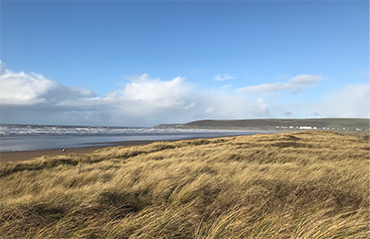Live well in Braunton
Dr Emma Ladds worked with a social prescribing project in Braunton, Devon, to help develop tools to measure project impact.
 Braunton, Devon.
Braunton, Devon.“People might be offered opportunities or support to take part in different activities, be supported with practical help like filling forms or with transport or be linked with someone to reduce their social isolation,” explains Emma Ladds. “Alongside appropriate medical care and treatment, such interventions can have a positive effect in improving quality of life and helping people manage complex mental and physical health conditions.”
Braunton, in South-West England, is a rural area with limited infrastructure and services. As a prime tourist and retirement area, with a high number of second homes, isolation and chronic health conditions are a part of life for many residents.
The ‘Live Well in Braunton’ Connecting Communities initiative was set up by a local GP Susanna Hill and a committee of engaged individuals in 2019 to help support and connect vulnerable members of the community. There was a recognition that many local residents were inadequately supported by existing health and social services and that the community as a whole could work together to develop solutions for some of their challenges.
In 2019, the committee identified the need to better monitor its activities and approached Oxford-based GP and researcher Emma Ladds – who has links to the area – for help.
After conducting some preliminary interviews, she established that LWIB wanted to be able to track the number of people it engaged with, the type of support offered in each case, and – crucially – the difference it made to people’s lives. “It’s vital to be able to demonstrate impact to stakeholders and potential funders and capturing the information to be able to do this was really important,” comments Dr Ladds. “But I wanted to be sure we looked at outcomes that were most important for the people on the ground – the LWIB team and the people they support – so they could use the findings to plan and develop future work.”
Ladds undertook a series of interviews to gather information about how users had engaged with the project and what changes it might have enabled in their lives. Funding from the KE Seed Fund allowed the project to commission a local designer to develop a bespoke database to collect and analyse quantitative data about the service.
“There are a number of off-the-peg commercial packages, often used for social prescribing projects,” explains Ladds. “But we wanted something very flexible, which would allow us to identify and measure activities relevant to the project – something as simple as taking part in trips to the garden centre for example – rather than the more complicated metrics some of the more expensive databases produce.”
The database went through several iterations in development to ensure it was as effective and user-friendly as could be. The COVID pandemic meant that the development process took longer than hoped, but the system has been up and running since Spring 2020.
Project founder, Dr Susanna Hill, says that the database really helped LWIB easily collect effective data and track client information over time, making it easier to extract information about referrals and manage workload. This also helped inform a Big Lottery funding bid to secure the future of the service.
Dr Ladds says: “LWIB shows the value of thinking broadly to meet a community’s needs. It’s certainly not an alternative to statuary services and needs to be seen within a wider community development programme. But we’ve seen the real difference it can make to lonely and isolated people in Braunton.”
Dr Emma Ladds is a GP in Eynsham, Oxfordshire, and NIHR-funded In-Practice Fellow at the Nuffield Department of Primary Care Health Sciences
Project team
Dr Susanna Hill, Live Well in Braunton
Daniel Burt, freelance database designer
Funders: KE Seed Fund, One Northern Devon